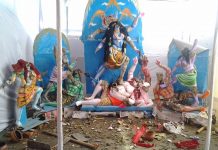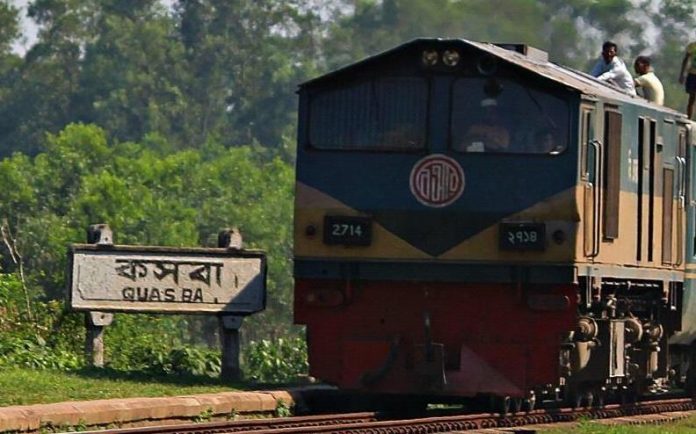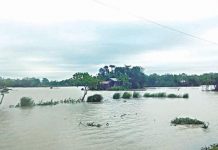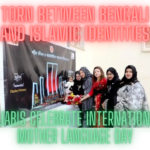Teacher’s Travelogue: A Journey to Bangladesh
– Kashiraj Pandey
The Journey until Dhaka
So many times I have fallen in love with risks and chances and it was not the first time I left
home for distant places. To embrace twists and turns, I believe is my way of life where pain and pleasure are the reality of life and always I understand them in relative terms, that differs according to time and space.
Robert Louis Stevenson’s remark, ―There are no foreign lands. It is the traveler only who is a foreign‖, had a lot to do with me when I was excited to leave home on May 16, 2011 for a kind of new experience, to experience new place, the new way of living, and more nostalgic to go back to experience the challenges which were my fate in my youth. This trip to Bangladesh transpired as my latest jaunt that was possible because of BELTA, because I worked at Kathmandu University, and because I could represent NELTA abroad. I knew where I was supposed to go but never worried how I was going. Unlike my wife’s worry that I could sense from her frequent visits to the temples around Kathmandu until the eve of my departure, this journey was supposed to be more comfortable as I knew that for the first time I was leaving home unassigned and without any major mission; I was not leaving home to find a job at least, and I was travelling with enough money, no one to accompany, no children, no wife, not any sick person to care for, nor a piece of luggage to look after. I was a traveler with a scanty bag that readily fit anywhere. We were two; I with my small bag, every moment with new settings, new people around, and new landscapes—of course.
It was Monday, and for us it was very unlikely to leave home in the evening, but I left home
early evening that day, for I had the reason to spend some more time with my friend/s, also to save little money that I otherwise would have spent for a Night bus, and surely to make my journey less droning, I joined the group of students with my colleague Mr. Khagendra Acharya, who were leaving Kathmandu for a mission, an educational tour with assignments. A bus to take them to, they had, but I was a rambler, just crept into the team who would depart any moment and from anywhere. I went with them towards the East; I was heading further – to Bangladesh and all others to Darjeeling and then to Sikkim. The following day, May- the 17th, Tuesday, I had the challenge, though prepared, to meet peoples of slightly different cultures and language, and the rest in the bus who set their journey for an educational tour seemed more comfortable. I was alone, they were in group. There was a strike that day, a regional group had called for, and the entire Eastern region of Nepal was brought to a standstill where ours was the only vehicle on the road most of the times. We all had lunch at Itahari, then went to Himalayan Tea Garden, and parted for a week. They went to Ilam, I waited at Birtamod for a bus going to Kakarvitta, on the day of strike hoping some would operate after the life got normal by the evening.
Yes, when there is will there is way, and there was a way. A bus appeared, fully occupied inside and at the pinnacle. I got on, on the hood, wow! For an hour’s ride. I reached Kakarvitta. Interestingly, I was more relaxed as I was approaching the Indian border, at least no banda, end of uncertainity, huh? Yah, I got hold of a rickshaw for IC 20, cool! that took me to Panitanki, then came across a familiar voice, a person who must be the conductor of a bus uttered many words in my own language, in Nepali. Siligudi… Siligudi…, Tadhai bata chiniyo, Dhaka topi Launelai… I was going to Dhaka wearing Dhaka topi, as you also might agree, we are more emotional with our own culture and the assets when we set out of familiar settings, to recall one moment I used fingers to eat in one of the fancy restaurants in the USA some 15 years ago, more melancholic we become the more we move farther. Then, I got on the bus to Siligudi for IC 20, unexpectedly inexpensive fare. I had been to India several times and I never thought that I was a foreigner in India and that was the point of departure for all adversities ahead.
Reaching Siligudi, I had to stay a night there, same life, same people but different country, which I could hardly realize. Alone were I, and an alien traveler. I can imagine what I did not do there? Drinking Daab-pani which my professional kudos would have barred me to enjoy as a layman enjoys, drinking Daab-pani with the common laborers around, a fine experience, I even had two. I entered a Bar, where the most beautiful creatures of Siligudi were singing nice Hindi Songs. Seeing me with Nepali topi, the Dhaka topi, a hope to my safe journey to Dhaka, the stunning brat sang Resham Firiri… Good, because I had the reason to tip them when the singers stepped down shaking hands with me and my new colleagues there on the table. Otherwise this teetotaler had no reason to enter the bar except to explore what right or wrong goes there. Musical voice, so was the walk and look, IC 50 as tip, La ja4
and IC 50 for a glass of Fresh Lemon Soda. After sometime, I went out; saw so many open stalls, so welcoming they were, all were inviting me, which rarely happens in my home even. I know my people do not need to impress me and may be because I do not pay instant cash in my home, or they take me as granted, at least they know I don’t mistake visiting my neighbors for Dinner. Yah, I went to a stall who I thought was more hospitable and the woman was very happy, happier when I paid her two more rupees, the bill
was IC 78, but I gave her 80, and let her keep the change.
Well I still had to look for a hotel. Normally I do not bargain, and that’s where I am always
condemned by my nearests in home, though always appreciated by the shopkeepers, and
wherever. But, in Siligudi, I did it, with the hotel people. The sole reason was the value of
money. They would ask IC 1000, I would calculate as NRs1600, which I used to do same way when I was in the USA…if you allow me to recall the moment, we even did calculate before we ordered a pizza- ($4.99+tax) x 56 (Now, newly reached people in the USA from Nepal may multiply by 72 instead as it is a story of some 15 years ago).
I bargained, and it worked, I could see in me, a winner! when the hotel manager agreed to give me an A/C room against my IC 600, which perfectly responded my expectation, some NRs. 1000 with tax, and a room with all amenities, fruit basket, cookies, and a welcome drink to mention some. So relaxed I felt, with sound and safe sleep I spent a night in Siligudi.
Next morning, as advised by one of the students studying at the School of Education, a student from Bangladesh, I headed towards a luxurious bus counter that would take me direct to Dhaka. To my surprise, the bus was booked for four more consecutive days. I had no choice but to take a local bus to Chyangrabanda, the bordering hub from Indian side expecting to catch another vehicle from Burimari, the Bangladeshi point to start my next journey till Dhaka.
Yes, I took a bus, and the fare was again unexpectedly inexpensive, IC 40. I did not bargain. But, the bus left me at the detour where I still had to spend more time and money to reach the border. The rickshaw took IC 50 from me, and that was the beginning point of impasse until I reached Dhaka. As I reached Chyangrabanda, I looked for a money changer. Readily available they were there. Free service, one said. Free service! Yah, I guessed that fellow would cover his loss from the transaction anyway. Okay, I said to one and changed all the IC I had, submitted the passport to the border police. I told you, the price of my emotional affection with India was then discerned vividly. As I did not worry much to take an exit from Nepal, while entering India the previous day, how could these border security officers would let me a way out from them. Oh, yah. The money changer became a relief to me then when I was in a dilemma whether to return all the way to Kakarvitta, the Nepal-India border and follow those procedures or to spend some money as advised by that money changer who would manage things free of cost. He told me he could manage me through if I were ready to spend IC 500 where he would not reveal the grammar, his service would be free, and I could reward for his creativity, if wished after reaching the next corner, he said. I agreed, I surrendered everything to him, went straight to the next side, my small bag arrived in a couple of hours but I spent all day waiting for my passport which I could see with the person who issued a bus-ticket for me to Dhaka from Burimari. Whenever I asked the boy if I could get my passport back, he would love to postpone my request, saying, ―It’s with me.
Don’t worry.‖
While I was keenly watching my passport, I saw that man showing my passport to other people; probably to the new arrivals from Nepal, most of them were students who had their
regular bus to choose going Dhaka. Later I realized the money changer handed over the passport to this man who worked for the Paribahan and this man would keep my passport to show other people to assure them that I was travelling in their bus, a proof where no one would trust anybody, and everyone would suspect every other person, the borders must be like this everywhere I supposed. I even enjoyed with a little bit disquiet moment while I was waiting at the Paribahan counter when I was sold a ticket for 4 pm bus, but never saw one until 7 pm before they somehow boarded me on the next one, the infinite malpractice of professionals at the border where swindling was rife and bribery I could see across the surface. To my great shock, the bus I got the ticket only had three other passengers like me and for no reason they wanted to operate the vehicle that day. Finally, lucky I was as the next bus accepted us, at least, if not comfortable seats when laid in another company’s bus. Therefore, nothing could I ever experience black-and white if I did not decide to travel by land.
Journey further set out, little hungry I was as I failed to feel differently. I thought I could get
anything to eat and drink, but unlike ours or Dhaka or Siligudi, when a place does not expect
tourists from different cultures and places, I realized the local people also do not prepare
differently. Life was beautiful for the people in Burimari at the border who only served MasuBhat, and I chose to take a risk until the bus stopped for a good food on the way.
As a traveler, I had a first class life, every day. Though I was not supposed to get the front seat when transferred from the next bus company, I don’t know why but I induced Taka7
300.00 to Bangladeshi currency the driver and he happily offered me the better-seat. The journey was full of beauty, charm and adventure. I met a lot of people in Nepal, in India, and in Bangladesh. I even encountered myself going hungry for hours, and the real food after hours of bus ride, My! The delicious ding Paratha, I ate at 2 am… to make my travel better, I tried my best to enjoy the food, respected the customs, very inquisitive to know new things.
On the way to Dhaka, my first curiosity was seeing the male passengers getting down from the bus and in that short break they sat down to urinate. When I was the only one trying straight, ―Ee! Baitha—Eta Bharot naa‖.
The conductor shouted at me thinking I was an ignorant Indian not knowing or ignoring that it was taboo urinating that way in that country of Bangladesh, I guessed. Not avoiding a single stance, greatest reward and luxury of travel for me was to be able to experience things and my visit to Bangladesh was for the first time where I tried to sit down, but that did not help me. Actually, I had to suppress everything until I reached Dhaka. Great the bus counter had one, though not regularly serviced but that was a fine relief. The most sought gadget for the travelers like me and of course for the females was a toilet, can it be everywhere but at least in certain places, but tourists by bus were taken for granted, and in that route I did not feel the government acknowledged our presence.
Seeing Myself in Dhaka
I did not have fixed plans and no one was worried about my arrival. For me, to experience
everyday in which almost nothing seemed so familiar was the pride of travelling that way. I
reached Dhaka around 10 am, the 19th May, 2011. As I was told to meet BELTA colleagues at 4 pm, that 10 to 4 worked so well that I explored many parts of Dhaka on the first day that
delegates other parts of than Bangladesh and a colleague Ganesh from Nepal, another
representative from NELTA, who took a flight to Dhaka the same day with grants from the
British Council, was surprised to see me steering him towards many corners of Dhaka during our
stay there.
Meeting Sudebjee from English in Action and Sonia from BELTA at the BIAM at 5 pm, the
conference venue made me realize that a journey is best measured in friends, rather than miles.
As soon As I met them one let me use his computer and the next offered to join for the snacks.
At the Conference
As announced, the conference started on time. At 8.30 am, the volunteers were ready, waiting for
the participants and delegates to register. Most of the presenters had registered the previous day.
During 9.00 to 9.45 , I could see all participants, presenters and delegates inside the dining hall
each holding a cup, exchanging greetings and talking, every one busy, what a fine opportunity
for networking!
And I was busy too, talking to everybody, if not as many people as I could find who loved
listening others, not many actually. But, I did my best to make me heard, and they were amazed
to see me and the way I reached there (you know in 40 degree Dhaka city, a man arrives by bus,
all wet from every corner of his body and sweating, with fairly grubby clothes, never taken
shower for three whole days and nights) and how I travelled all the way to Bangladesh by bus,
and my unplanned journey by road– no seats in a scheduled bus with all hopes to eat and stay
in readily available local hotels… and more, all fun when things went well, and that’s how I was
there, very excited.
Then I saw all going towards the hall by 10.00 for inauguration, so quiet, so curious we all were.
Then at 11.00 the plenary started with David Graddol for an hour, where he highlighted how the
global trends are affecting in reshaping the world of ELT.
Before the concurrent sessions started at 12, I could see all the presenters working on their slides
to shorten them so as to fit within the 25 minute time bound which was not very normal for
anyone, and I was no exception either, for presentation in such huge gathering meant for an hour
in general. The volunteers in different rooms were so alert, and time sensitive. After 20 minutes,
they would show a placard saying 5 MINUTES, which was a good signal for the smart
presenters to conclude and switch into Q/A session. And in next 5 minutes, STOP!.
Some big names like Fife MacDuff , Jeremy Harmer enjoyed the opportunity to present at the
auditorium for an hour each where other presenters like me had to compromise with a normal
hall for 25 minutes time limit, and mine to be more specific was in the fourth floor. Yes, I also
had my session on the first day with a topic, Journaling for Teacher Development: An
Autoethnographic Approach. I could see all participants very enthusiastic, excited for the topic;
for the technique of journaling, for an autoethnographic approach they wanted to know what it
was and of course some were little skeptic on how would I deal the topic, very curious, very
inquisitive, and involving.
After I gave my session, a bunch of BELTA members, the young faculties from universities in
Dhaka encircled me, nice to see them falling in love with autoethnographic approach, I know
who does not love to talk about their own feelings and emotions, and more than that, about what
Creswell (2002) claims as ―a reflective self examination by an individual set within his or her
cultural context‖ (p. 438). When people have their own creation and feeling, they look for their
own space within creativity, while autoethnography gives a space to display our multiple layers
of consciousness, connecting the personal to the cultures around and that was reason they loved
to hold me back. Revealing my days for the past three years that once I started to work in this
domain, I have found people around me valuing and celebrating my efforts, kept me update and
fresh all the times. I have never found anyone coming out to harm my creation, when I believe in
―heart to heart communication‖ in writing. My teachers, colleagues, students, family members,
readers, and participants in any workshops have given energy to save me ahead.
A professor from Eastern University did not delay to invite me to her university to talk about my
attempt in using reflective journals to garner students’ and teachers’ creativity as well.
I readily accepted where pleasure was all mine to meet the young budding writers, the faculties
of English Department at the Eastern.
At the Eastern
It was already four and the CNG auto took us at the University’s building in Dhanmundi. The
professors, especially those who were writers too, were waiting for us. I had Mr. Ganesh
Gnawali, my colleague from Nepal, with me. Yes, I shared my experience as a writer, the
contents we readily get in this part of the world. I talked about some best pieces of Literature that
I have read from around the world. I was more lenient towards the one that best represented life,
society, and cultures of course, starting with what we already know. People have their own style
of creation and feeling, very unique but universal. Those dynamic participants promised they
would keep in touch, let see how we could keep the promises further, may be by exchanging the
ideas, writing and publishing more books of creativity, documenting the moments of pain and
pleasure, ups and downs as what was done by other writers, their influencing texts. To name a
few texts like King Lear, Malini, Kabuliwala, The Great Railway Bazaar, The Kite Runner,
Swan Song, The Necklace, The Lunatic, Munamadan, and Gauri are some works that the world
cannot forget even someone is indifferent to, and all of them somehow were able to capture the
moment that reflected the social-cultural, or personal-political experiences based on their own
spacio-temporal context/s, and reading, such creation of other writers, works as burning fuel to
all writers on the rise when we all are the butterfly of a same garden with multiple sets of flowers
blooming within. That’s what I shared in the workshop at the Eastern based on my ongoing
research area, reflective practices (Journaling) for overall transformation in teaching- learning.
Thank you Professor Iffat Majid, for you gave this wonderful opportunity to meet all these
creative galaxy.
At the TA Meeting
Mr. Ganesh Gnawali and I attended a meeting with the leaders of teacher associations from the
region; from Bangladesh, from Pakistan, from Afghanistan, and from India. I was glad to
observe that the regional Teacher associations are taking NELTA as a model association. We are
also the one with branches all around the country who have active life members, more than 2000
by 2011. While other TAs were advocating to encourage young and new members, we had
already had Mr. Ganesh Gnawali, an aspiring and promising young man, the proof, whom the
committee recommended to avail the BC grant while myself, though representing the central
committee, so happily attended the conference on my own.
I shared how we are smoothly working with the government and the partners while it is still a
challenge for other TAs from neighboring countries. Our members’ active participation,
specially the new ones who wholeheartedly volunteer during the conference or throughout the
years was another asset we shared with them. Agreeing on the need of frequent exchange
programs, support in training and material development, and regional cooperation etc. the
meeting concluded hoping to meet again soon.
Finally,
As Aldous Huxley remarks, to travel is to discover that everyone is wrong about other countries,
I was really worried whether I would be sold on the way even before reaching Bangladesh
(Dhaka), but no one tried to hurt me in any cultural (sensitive) matters. However, as a tourist I
could sense how easily things were sorted out when we spent money. Had the money changer
not arranged the easy escape, I would have returned Kakarvitta instead of heading towards
Dhaka from Burimari. And I had a good cause for this. At Burimari, but I should confess, I was
so happy to see the humans in uniform accepting any amount of money from anyone with great
confidence, confidence counts, doesn’t it?
For me this visit was enough to smell and understand that I think I need to stay there more.
Hopefully in my next visits I will have the real sense of Beautiful Bangladesh, the slogan I
missed to see at Burimari, but vividly visible at the airport when I was about to flee back. I was
capable of both; to grapple with the limitless kindness of all English speaking BELTA colleagues
and experiencing all uncertainties that made my journey to Dhaka, terribly wonderful. Heroism it
is when we overcome but who knows if one disappears taking risks, more frequent and
unplanned trips like this, but I would suggest taking the challenge to those who are ready to
accept anything. Good that I returned home as I really wanted to get back to.
To all dear friends in Bangladesh
So nice to hear you back from B’desh,
Now seeing myself as an actor between ‘Swo-desh’ & B’desh .
This great moment-something to share,
You wished I be ‘there’,
I wished you were ‘here’,
So, life!
Yah, what is it?
Seems to be a pendulum between ‘here & there’.
In next conference -I again hope to be there,
From Nepal now– friends! isn’t it fair?
Shuvo!
Reference:
Creswell, J. W. (2002). Research design (2nd ed.). California: Sage.






































